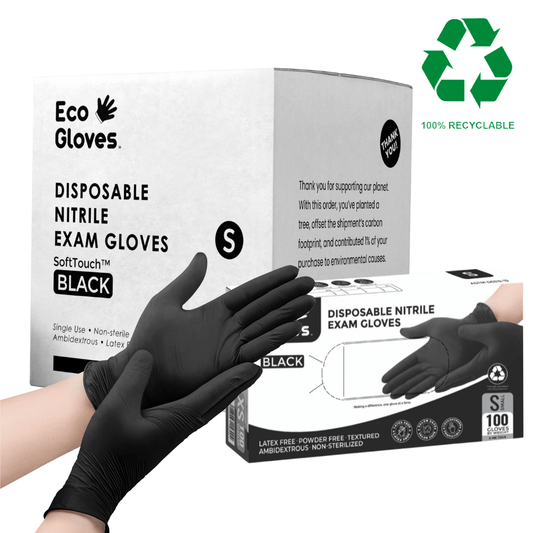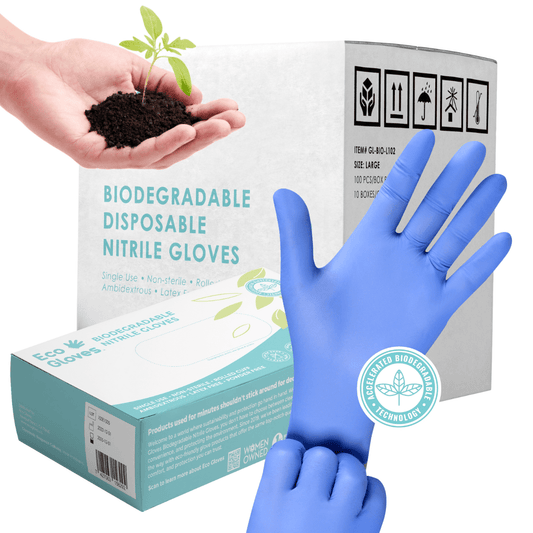Top Benefits Of Using Nitrile Disposable Gloves Over Latex And Vinyl
Eco Gloves
Disposable gloves are essential across many industries, from healthcare and food service to janitorial and industrial work. As the demand for disposable gloves grows, the need for selecting the best material to ensure optimal safety, comfort, and environmental responsibility increases. Among the three main types of disposable gloves—latex, vinyl, and nitrile—nitrile has increasingly become the preferred choice across various industries, offering enhanced durability, allergy prevention, and resistance to various chemicals.
To understand why more businesses are choosing nitrile gloves we’ll explore what nitriles are made of, the core benefits of nitrile gloves, the superior feature that sets nitrile apart from latex and vinyl gloves, along with the industries that choose nitrile gloves as well as sustainable options to nitrile gloves.
Topics Covered
- What Are Nitrile Gloves?
- Nitrile’s Chemical Compatibility
- Understanding Chemical Resistance in Glove Materials
- What Tasks or Industries are Nitrile Gloves Best Used For?
- Eco-Friendly Choices: Addressing Environmental Impact with Nitrile and Beyond
- Frequently Asked Questions About Nitrile Gloves
What Are Nitrile Gloves?
Before diving in deep it's important to understand: what are nitrile gloves? Nitrile gloves are disposable gloves made from nitrile rubber, a synthetic rubber material derived from acrylonitrile (ACN) and butadiene. Being a synthetic rubber, nitrile gloves are entirely latex-free, BPA, phthalate, vinyl, and MBT free. Available in various thicknesses and colors, nitrile gloves are widely used in medical, industrial, and food service settings due to their reliable performance and versatility.
Key Advantages of Nitrile Gloves Over Latex and Vinyl

There are many key advantages to choosing nitrile over the traditionally popular latex and vinyl gloves. Below we outline some of the key benefits of nitrile gloves:
Ideal Gloves for Sensitive Skin
One of nitrile gloves' most significant advantages over latex is its hypoallergenic nature. Latex gloves, traditionally the go-to material in healthcare and many other fields, are made from natural rubber, which have been commonly known to cause allergies in some people. According to the American College of Allergy, Asthma, and Immunology (ACAAI), approximately 1-6% of the general population experiences latex allergies, with higher sensitivity in healthcare workers due to constant exposure (ACAAI, 2021).

In contrast, nitrile gloves are entirely synthetic and free from latex proteins, which helps to eliminate the risk of allergic reactions commonly associated with latex material. Nitrile gloves are also free from powder, a common irritant in some glove types, ensuring maximum comfort during use. Their smooth interior and snug fit also help minimize friction, reducing the risk of skin irritation even with prolonged wear.
Great Gloves for Durability
Nitrile gloves are renowned for their superior durability, with many studies showing nitrile outperforming both latex and vinyl in demanding environments. In comparison to latex gloves, nitrile gloves are generally considered more durable than latex gloves, particularly when it comes to puncture and tear resistance.
In comparison to vinyl gloves, which tend to break down under stress or extended use, nitrile maintains its integrity even during prolonged wear, ensuring consistent protection.
Their durability translates to fewer glove replacements, enhancing cost-effectiveness for businesses and ensuring uninterrupted workflow in critical tasks.
Best Gloves for Thickness and Puncture Resistance
Nitrile gloves have been known to be highly resistant to punctures and tears, making them ideal for tasks involving sharp objects or hazardous substances. Their puncture-resistant properties make them more reliable for tasks involving sharp objects or abrasive materials, reducing the risk of tears and leaks that could compromise safety.
Nitrile gloves typically range in thickness from 3 to 8 mils, with many industrial-grade gloves falling in the 5-8 mil range for superior protection. Thicker nitrile gloves typically perform exceptionally well in high-risk environments, offering enhanced puncture resistance to their counterparts. In fact, research indicates that nitrile gloves are up to three times more puncture-resistant than latex gloves of similar thickness, which is critical in industries involving sharp tools and equipment.
Excellent Gloves for Comfort And Fit
Comfort is an often-overlooked factor when choosing disposable gloves, yet it plays a crucial role in user experience and compliance. Nitrile gloves have evolved significantly in recent years to offer a comfortable, contoured fit that mimics the flexibility of latex without the associated allergy risks. These gloves conform well to the hand, allowing for excellent dexterity and a more natural feel, which is especially important in tasks requiring fine motor skills. While latex gloves might offer slightly better dexterity than nitrile, nitrile gloves typically offer a better fit than vinyl gloves.
Preferred Gloves for Texture and Tactile Sensitivity
High-quality nitrile gloves often feature textured fingertips, enhancing grip and tactile sensitivity. This is especially useful in medical or laboratory settings where precise handling is necessary. Vinyl gloves are typically less form-fitting and offer limited tactile feedback, which can be a drawback in detailed tasks. Additionally, there are fewer options for textured vinyl gloves, making nitrile the more attractive choice.
When it comes to the comparison against latex gloves in this department, nitrile gloves generally have a slightly less smooth texture and offer lower tactile sensitivity to latex. This means they may not feel as delicate or provide the same level of fine touch perception making latex the preferred choice for tasks requiring high precision and dexterity.
Ideal Choice for Prolonged Wear and Long-Term Storage
Nitrile gloves are considered better for prolonged wear because of their superior durability, high puncture resistance, and excellent chemical resistance compared to other glove materials like latex, making them less likely to tear or degrade when exposed to harsh substances over extended periods of time; this allows for safer and more reliable protection during long tasks. Additionally, nitrile gloves tend to resist degradation when exposed to sunlight, moisture, and general wear, maintaining their protective qualities over extended periods of use. Nonetheless, to maintain the best quality gloves, it is important to properly care for and follow manufacturer storage requirements.
Best Gloves for Chemical Resistance
Nitrile gloves exhibit exceptional chemical resistance, making them suitable for handling various chemicals that might otherwise damage latex or vinyl. These gloves are specifically engineered to withstand exposure to harsh substances, including oils, solvents, acids, and certain chemicals that would typically degrade latex or vinyl gloves.
Nitrile’s Chemical Compatibility
Unlike latex, nitrile gloves exhibit a high level of resistance to a broad spectrum of chemicals, including:
- Petroleum-based Products: Nitrile gloves are highly oil resistant, making them ideal for use in automotive and mechanical settings.
- Solvents and Grease: Nitrile’s resistance to industrial solvents provides dependable protection in sectors where harsh chemicals are common.
- Common Laboratory Chemicals: Laboratory environments often require gloves that can withstand alcohols, acids, and bases, whereas nitrile gloves perform exceptionally well.
This resilience makes nitrile gloves ideal for industries many industries, including healthcare, automotive, laboratory work, and industrial cleaning.
Understanding Chemical Resistance in Glove Materials
Chemical resistance is a critical factor when selecting disposable gloves, especially for industries that involve handling hazardous substances. Different glove materials—such as nitrile, latex, vinyl, polyethylene (PE), thermoplastic elastomer (TPE), polylactic acid (PLA), and neoprene—offer varying levels of protection against chemicals, making it essential to choose the right material for your specific tasks. This chart provides a comprehensive comparison of glove materials, their resistance to different types of chemicals, and common use cases. Whether you work in healthcare, laboratory settings, or industrial environments, this guide will help you make an informed choice for maximum safety and performance.

© 2024 Eco Gloves. All rights reserved. Visit www.ecogloves.co for more information.
What Tasks or Industries are Nitrile Gloves Best Used For?
Nitrile gloves have become a trusted solution in numerous industries, thanks to their unique combination of durability, chemical resistance, and comfort. Designed to meet the needs of various tasks, from precision work to heavy-duty applications, these gloves provide reliable protection without compromising on flexibility or performance. Some industries that prefer nitrile gloves include:
- Healthcare and Medical: Nitrile gloves are indispensable in hospitals, clinics, and emergency services for protecting against infectious agents, bodily fluids, and hazardous materials. Their hypoallergenic properties make them a safer alternative to latex gloves, especially for patients and healthcare workers with latex sensitivities.
- Laboratories and Research: Ideal for scientists and researchers, nitrile gloves provide robust protection against chemical spills, biological agents, and contaminants, ensuring safety in environments where precision and contamination control are critical.
- Automotive and Mechanical: Resistant to oils, greases, and chemicals, nitrile gloves are essential for automotive technicians and mechanics. They offer a strong barrier while allowing sufficient dexterity for handling tools and intricate parts.
- Food Service and Handling: Nitrile gloves meet FDA standards for food safety, making them a reliable option for food preparation and handling. Their durability ensures they remain intact during extended use, preventing contamination while maintaining hygiene.
- Cleaning and Janitorial Services: Their chemical resistance makes nitrile gloves ideal for handling cleaning agents, disinfectants, and detergents, protecting workers from skin irritation and harmful substances.
- Tattoo and Beauty Industries: Nitrile gloves are a go-to for tattoo artists and salon professionals due to their sleek appearance, puncture resistance, and barrier protection against inks, dyes, and chemicals.
-
Industrial and Manufacturing: In heavy-duty environments, nitrile gloves withstand exposure to harsh chemicals, abrasions, and sharp objects, making them indispensable for workers in manufacturing and chemical processing.
Eco-Friendly Choices: Addressing Environmental Impact with Nitrile and Beyond
With the growing demand for nitrile gloves and disposable gloves across various industries, concerns about glove waste pollution and its impact on the environment, wildlife, and human health have intensified. As a result, eco-conscious companies are actively seeking sustainable alternatives to minimize their environmental footprint. Innovations in glove technology have paved the way for eco-friendly solutions, including improved recycling methods and accelerated biodegradable formulations, offering a practical response to the significant waste created by traditional disposable gloves.
© 2024 Eco Gloves. All rights reserved. Visit www.ecogloves.co for more information.
Here are some of the sustainable solutions being developed as eco-friendly alternatives or solutions to nitrile gloves:
- Biodegradable Nitrile Gloves: These gloves are designed with special additives that enable them to break down more rapidly in landfill conditions, significantly reducing the time they remain in the environment compared to traditional nitrile gloves.
- Recyclable Nitrile Gloves: Made to be compatible with recycling programs, these gloves can be processed and repurposed into new materials rather than contributing to waste in landfills. They are crafted to be disposed of through specialized recycling facilities.
- Eco-Friendly Manufacturing: This approach emphasizes the use of renewable energy sources, such as biomass fuel and co-generation plants, during the production of gloves. It also involves minimizing carbon emissions and improving energy efficiency to reduce the overall environmental impact.
- Reduced Packaging Waste: Sustainable brands often use minimal or biodegradable packaging for their glove products, further decreasing plastic waste and enhancing the overall environmental friendliness of their offerings.
By focusing on end-of-life concerns, there are opportunities for nitrile gloves to make less of a detrimental impact on our environment. At the same time it’s important to choose to purchase with suppliers who prioritize environmental stewardship and protection.

With allergy prevention, durability, and chemical resistance as standout benefits, nitrile gloves have rightfully earned their reputation as the go-to disposable glove solution. Individuals and businesses alike can enjoy enhanced safety and reliability without compromising comfort or environmental responsibility by choosing nitrile over latex or vinyl.
Make The Sustainable Choice With Eco Gloves
At Eco Gloves, we’re committed to providing high-quality, eco-friendly glove options that cater to a wide range of needs. Our selection includes biodegradable, compostable gloves, and recyclable gloves aligns with our mission to reduce environmental impact while delivering top-notch protection. Whether you’re looking for reliable gloves for professional use or personal safety, Eco Gloves offers sustainable solutions to help you positively impact your safety and the planet.
Explore our range of sustainable gloves today and take a step towards safer, greener protection!
Key Takeaways: Top Benefits of Using Nitrile Disposable Gloves Over Latex and Vinyl
-
Hypoallergenic Advantage: Nitrile gloves are latex-free, reducing the risk of allergic reactions and making them ideal for sensitive skin.
-
Superior Durability: They outperform latex and vinyl in puncture and tear resistance, lasting longer in demanding environments.
-
Better Puncture Resistance: Nitrile gloves are up to three times more puncture-resistant than latex gloves of similar thickness.
-
Enhanced Comfort and Fit: Modern nitrile gloves provide a contoured fit and flexibility similar to latex without the allergy risks.
-
Improved Grip and Tactile Sensitivity: Textured fingertips ensure reliable handling, especially in wet or precision-required tasks.
-
Excellent Chemical Resistance: Nitrile withstands oils, solvents, acids, and harsh chemicals better than latex or vinyl.
-
Long-Term Storage Stability: They resist degradation from sunlight, moisture, and environmental exposure.
-
Industry Versatility: Ideal for healthcare, laboratories, automotive, food service, cleaning, tattoo, and beauty industries.
-
Sustainable Options Available: Biodegradable and recyclable nitrile gloves reduce environmental impact.
- Eco Gloves Commitment: Offering nitrile gloves that balance performance, comfort, and sustainability for professional and personal use.
👉 Choosing nitrile gloves over latex and vinyl ensures stronger protection, allergy prevention, and better performance across industries—while still offering eco-friendly options.
Frequently Asked Questions About Nitrile Gloves
-
Are nitrile gloves better than latex gloves?
Nitrile gloves are often considered better than latex gloves for durability, puncture resistance, and chemical protection. They are latex-free, making them safer for people with latex allergies. While latex offers slightly better tactile sensitivity, nitrile provides a strong balance of strength, flexibility, and safety for medical, industrial, and cleaning use.
-
What are biodegradable nitrile gloves?
Biodegradable nitrile gloves are designed to break down more quickly in landfill environments compared to traditional nitrile. They maintain the same strength and chemical resistance but reduce environmental impact, making them ideal for industries adopting sustainable practices.
-
Can nitrile gloves cause skin irritation?
Nitrile gloves are generally less likely to cause irritation than latex since they are free from natural rubber latex. Many are also powder-free to prevent irritation from powder residue. Rarely, dyes or additives can cause mild skin reactions—choosing hypoallergenic or chemical-free gloves can help reduce this risk.
-
Why do tattoo artists prefer black gloves?
Black nitrile gloves offer a professional appearance and hide ink, blood, and stains during tattooing. They are durable, puncture-resistant, latex-free, and safe for both artists and clients, reducing the risk of allergic reactions.
















